By Jonathan Martinez - Florida Catholic
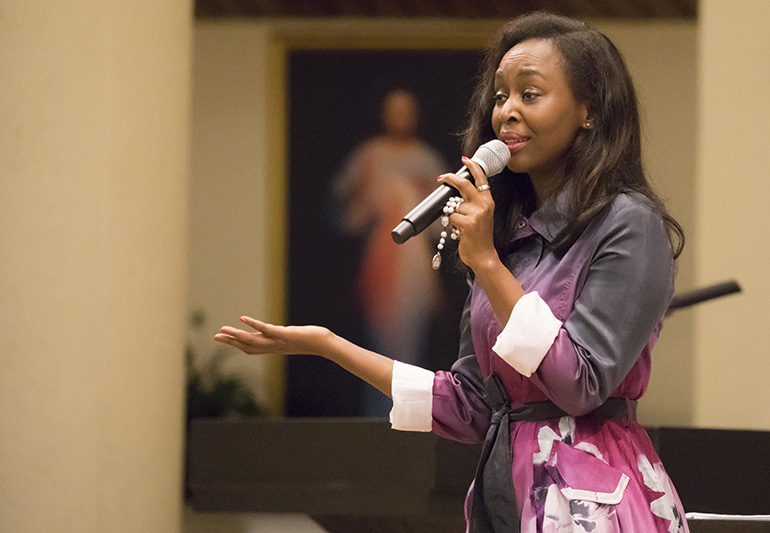
Photographer: JONATHAN MARTINEZ |FC
Holding a rosary, Immaculee Ilibagiza tells her story of faith, hope and forgiveness to the hundreds who came to see her at St. Bonaventure Church in Davie.
DAVIE | The story of Immaculée Ilibagiza began in a small village in Rwanda, Africa. She was born to loving parents and surrounded by three brothers she adored. She worked hard and had a good education until her story detoured and her life changed.
Ilibagiza survived the 1994 Rwandan genocide which massacred over one million people. She shared her story of survival, heartbreak, perseverance and faith with over 400 people Nov. 14 at St. Bonaventure Church in Davie.
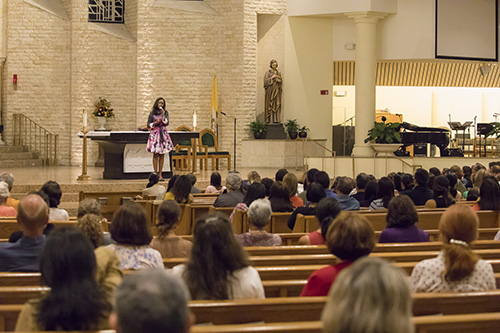
Photographer: Jonathan Martinez | FC
Immaculee Ilibagiza tells her story of faith, hope and forgiveness to the hundreds who came to see her at St. Bonaventure Church in Davie.
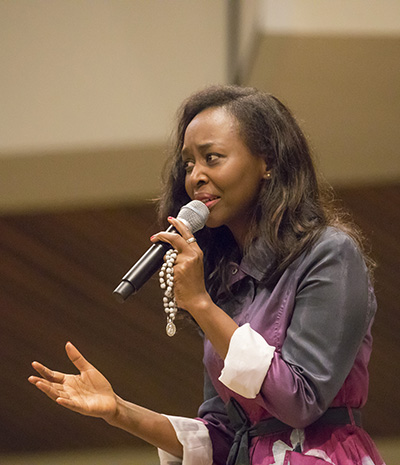
Photographer: JONATHAN MARTINEZ |FC
Holding a rosary, Immaculee Ilibagiza tells her story of faith, hope and forgiveness to the hundreds who came to see her at St. Bonaventure Church in Davie.
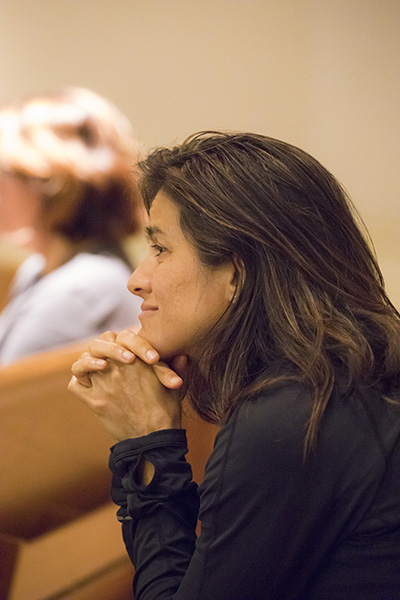
Photographer: Jonathan Martinez | FC
Claudia Ferer, parishioner at Bonaventure Church in Davie, listens to Immaculee Ilibagiza tell her story of survival during the Rwandan genocide. She survived hidden for 91 days with seven other women in a small bathroom, no larger than 3 feet by 4 feet.
She told them how she, along with seven other women, hid for 91 days in a small bathroom while people were being killed outside. Her parents and two brothers were among those murdered. She and the other women found refuge in the house of a local pastor who hid them in a 3-by-4-foot room.
“We ended up staying in that bathroom for three months. We went in April, we came out in July and the very first night I came out I found out everyone I left behind was killed � my mom was killed, my dad, my two brothers, my grandma, my grandpa, my neighbors, my schoolmates, my best friends, everyone was killed. I wanted to die.” Ilibagiza said.
But she didn’t die and she didn’t lose faith. Instead, her faith gave her strength, and the rosary her father gave her before she went into hiding “was a way of drowning out the anger inside me, and the evil outside the house.”
The rosary became a beacon in the darkness and helped her find a way to eventually forgive those who killed her family.
In addition to speaking to the parish community, Ilibagiza also spoke to over 500 students the next morning at St. Bonaventure School. She was invited to the parish by music teacher Ysomar Granados, who read one of her books and wanted the children and adults alike to hear her story of faith, hope and forgiveness.
“She is an inspiration to me. She is the definition of a good person, a good Christian, a good Catholic, a good human being and I wrote a letter to her. To my surprise, I got a response back two days after and then God just helped make this possible,” said Granados.
Ilibagiza shared her story with the children and also reminded them that, “God is with you always.”
“I think that's what God is calling us to be, hopeful, forgiving and loving,” said Granados. “I don't think it's a message meant just for this parish, it’s a message for everybody.”
In 1998, Immaculée emigrated from Rwanda to the United States. Since then she has worked for peace through the United Nations and has spoken at schools and churches throughout the world. Her story of survival and faith is inspiring to anyone who hears her speak or reads her books.
“My daughter is reading her book,” said Claudia Ferer, St. Bonaventure parishioner and parent of a sixth grader at the school. “Her religion teacher suggested for them to start reading ‘The Rosary’ book so it really got my attention. As I read a little bit about her story, I thought that it was just inspiring and very moving. It’s a blessing for us to have her here and to touch the lives not only of the parents but also of our children.”
As for Ilibagiza, she hopes that her message resonates with the children. "I hope that they understand the power of prayer and that forgiveness is possible. To know God is real. Hold on to him!"
She recounted how praying saved her life. She struggled with the "Our Father” because she couldn't bring herself to actually mean the part about "forgive us our trespasses as we forgive those who trespass against us."
So she decided she would skip that part but realized she was lying to God by editing the prayer that Jesus himself taught us to pray. She came to the realization that if he could protect her in that bathroom, he could help her forgive those who were murdering everyone around her.
"They never found me in that bathroom, but I found myself," she said. She told the students to love. “Others will make mistakes, others may hurt you but love them anyway. The genocide happened because people didn't love.”
She reminded them that "you can't change anyone, but you can change yourself. Resist hate. We all look alike in the image of God who created us. It doesn't matter what color you are, or culture. Don't judge others, don't put them in boxes just because of how they look or what they believe. Forgive with kindness. Pay attention to the one who is rejected or alone."
“It was a very significant message that she gave. For me it was the hope, the forgiveness part that was really powerful,” said Kenneth Ruiz, St Bonaventure parishioner.
“I started reading her first book, ‘Led by Faith,’ and it inspired me greatly” said Marianela Areces, parishioner and parent at St. Bonaventure. “If she could overcome the genocide by having faith then we can overcome any obstacle that we have with faith. If we could put that into practice every day that would really take us to another level much closer to God.”
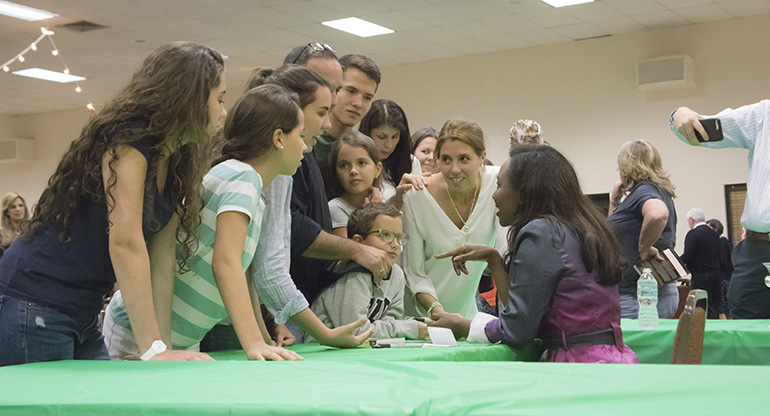
Photographer: Jonathan Martinez | FC
Immaculee Ilibagiza greets people who attended her book signing at St. Bonaventure Church in Davie.


Comments from readers